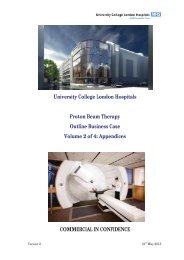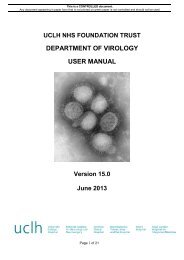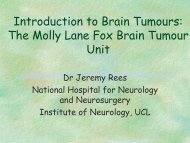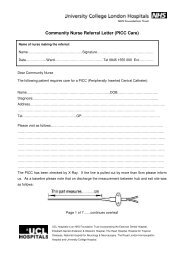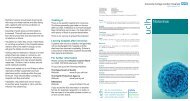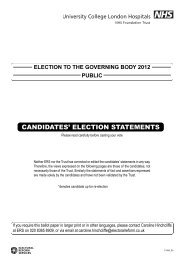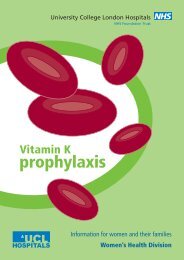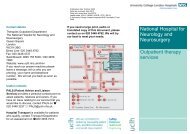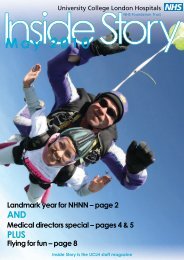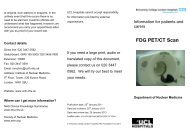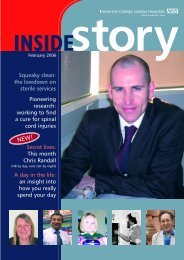How patients have helped us with our research - University College ...
How patients have helped us with our research - University College ...
How patients have helped us with our research - University College ...
You also want an ePaper? Increase the reach of your titles
YUMPU automatically turns print PDFs into web optimized ePapers that Google loves.
2<br />
Patients help design <strong>research</strong> studies<br />
Patients and community<br />
groups <strong>have</strong> been working so<br />
successfully <strong>with</strong> reproductive<br />
health <strong>research</strong>ers at the<br />
<strong>University</strong> <strong>College</strong> London (UCL)<br />
Institute of Women’s Health<br />
based at the Margaret Pyke<br />
Centre, that they now actually<br />
help shape and design <strong>research</strong><br />
studies.<br />
What began as a patient/public<br />
participation group to improve<br />
things like communication of<br />
the centre’s <strong>research</strong> findings<br />
has now become a Research<br />
and Innovation Forum, <strong>with</strong><br />
40 lay members including<br />
<strong>patients</strong>, local residents<br />
and representatives of local<br />
community groups.<br />
Patients now <strong>have</strong> a much<br />
greater input into <strong>research</strong> on<br />
contraception and reproductive<br />
sexual health. They don’t<br />
j<strong>us</strong>t comment on <strong>research</strong><br />
proposals. In some cases they<br />
are actually a ‘co-applicant’<br />
<strong>with</strong> <strong>research</strong>ers.<br />
<strong>How</strong> the <strong>research</strong><br />
forum works<br />
The Research and Innovation<br />
Forum, which was set up <strong>with</strong><br />
funding from a UCL Public<br />
Engagement Beacon Bursary,<br />
meets regularly to help develop<br />
<strong>research</strong> proposals and funding<br />
applications.<br />
Researchers tell forum members<br />
about their work and ideas for<br />
the future. In turn the members<br />
will comment and offer<br />
suggestions and constructive<br />
criticism on <strong>research</strong> studies.<br />
This is an important way of<br />
making sure <strong>research</strong> is relevant<br />
to the needs of <strong>patients</strong> and the<br />
community. Members review<br />
information such as patient<br />
information sheets and consent<br />
forms to make sure that<br />
information is clear and easy<br />
to understand.<br />
The group also looks at<br />
procedures in clinical trials and<br />
advises <strong>research</strong>ers on whether<br />
these will be acceptable<br />
to <strong>patients</strong>. Members<br />
help disseminate <strong>research</strong><br />
study findings and improve<br />
communication <strong>with</strong> different<br />
audiences.<br />
Importantly, the forum helps<br />
<strong>research</strong>ers link <strong>with</strong> groups<br />
of people who are normally<br />
hard to reach. Members of the<br />
forum are from a wide range<br />
of backgrounds, including age,<br />
ethnicity and income.<br />
Patients now <strong>have</strong><br />
much greater input<br />
into <strong>research</strong> on<br />
contraception and<br />
reproductive sexual<br />
health<br />
Members are already partnering<br />
up <strong>with</strong> <strong>research</strong>ers to make<br />
<strong>research</strong> proposals together – in<br />
this case members are known<br />
as co-applicants. And members<br />
are sitting on steering groups<br />
for individual <strong>research</strong> studies.



